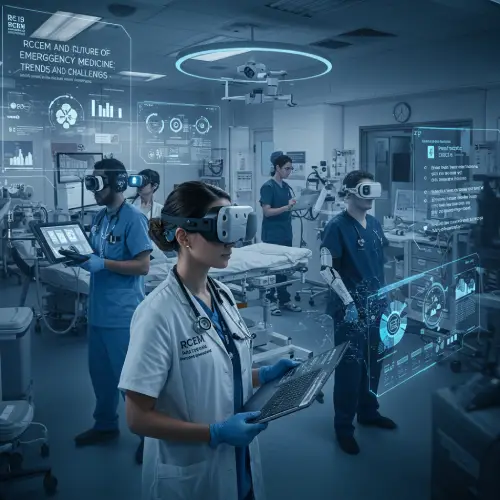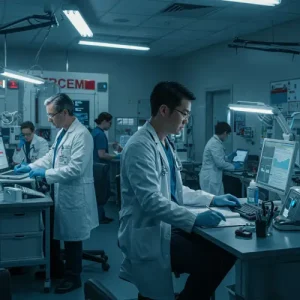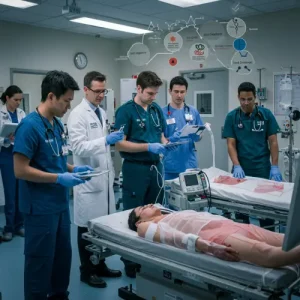Emergency medicine is a dynamic, fast-paced field that requires healthcare professionals to think on their feet, adapt to rapid changes, and make critical decisions in high-pressure situations. As we look to the future, it’s clear that the landscape of emergency medicine will continue to evolve, shaped by emerging trends, new technologies, shifting patient demographics, and increasing demands on healthcare systems.
The Royal College of Emergency Medicine (RCEM) has been at the forefront of ensuring that emergency care in the UK evolves in line with these changes. With its commitment to research, training, policy development, and advocacy, RCEM plays a pivotal role in shaping the future of the specialty and preparing emergency medicine professionals for the challenges and opportunities ahead.
In this blog, we’ll explore the key trends and challenges that are likely to define the future of emergency medicine, as well as how RCEM is helping to shape the way forward.
1. Increasing Patient Demand and Pressure on Emergency Departments
One of the most pressing challenges facing emergency departments (EDs) today is the increasing demand for emergency care. In recent years, EDs have seen a surge in patient volumes, driven in part by an aging population, increased prevalence of chronic conditions, and rising public expectations for quick and efficient care. The COVID-19 pandemic has only exacerbated these challenges, highlighting the strain placed on EDs and the broader healthcare system.
As patient numbers continue to rise, healthcare professionals are under more pressure than ever before. This results in longer waiting times, overcrowding, and stress for both patients and staff. RCEM recognizes the urgency of addressing these challenges and has been actively involved in advocating for increased funding, improved staffing levels, and better resource management within emergency care.
The future of emergency medicine will require a more sustainable model that can meet the growing demand for care while maintaining quality and safety. This includes finding innovative solutions for patient flow, enhancing the efficiency of care delivery, and exploring alternative models of care, such as urgent care centers and pre-hospital interventions.
2. Technological Advancements and Integration of Digital Tools
The future of emergency medicine will be heavily influenced by advancements in technology. From artificial intelligence (AI) to telemedicine and digital health platforms, technology is transforming how emergency care is delivered, both in the ED and in the community.
AI has the potential to revolutionize patient diagnostics, decision-making, and workflow management in emergency departments. AI tools can analyze vast amounts of patient data to identify patterns, predict health outcomes, and support clinical decision-making, ultimately helping to reduce diagnostic errors and improve patient care.
RCEM is already exploring how technology can enhance emergency medicine practice. The College has supported initiatives aimed at integrating AI, machine learning, and digital platforms into emergency care, ensuring that healthcare professionals have the tools they need to manage complex cases more effectively and efficiently.
Telemedicine is another emerging trend in emergency medicine, offering a way to provide remote consultations and extend the reach of emergency care to underserved or rural areas. As technology improves, RCEM is likely to advocate for the widespread adoption of telemedicine in emergency settings to improve access to care and reduce pressure on EDs.
Additionally, electronic health records (EHRs) and health data analytics are becoming increasingly important in streamlining patient care, improving communication between teams, and ensuring a more coordinated approach to emergency care. RCEM’s efforts to integrate digital tools into clinical practice will be a key factor in shaping the future of the specialty.
3. Mental Health and Emergency Care
As mental health issues continue to rise in society, emergency medicine professionals are increasingly required to address the mental health needs of patients in the ED. Whether it’s a person experiencing a mental health crisis, substance misuse, or the impact of trauma on mental well-being, emergency departments are often the first point of contact for those in need of urgent mental health care.
The challenge for emergency departments is how to provide appropriate, timely, and compassionate care for individuals with mental health needs while also addressing the pressures of a busy ED. This involves not only improving the skills and training of emergency medicine professionals in mental health care but also enhancing access to mental health services and ensuring appropriate referrals and follow-up care.
RCEM has been actively involved in advocating for better mental health support within emergency care. The College has called for better training for emergency department staff, improved mental health screening tools, and better coordination with mental health professionals to ensure that patients receive the care they need in the right environment. As mental health becomes an increasingly prominent issue in emergency care, RCEM will continue to lead efforts to improve mental health services and integrate them into emergency care settings.
4. Workforce Challenges: Recruitment and Retention
As emergency medicine continues to grow in complexity and demand, one of the greatest challenges facing the specialty is the recruitment and retention of a skilled workforce. Emergency departments are often under-resourced and staffed by overworked clinicians, leading to burnout, job dissatisfaction, and an overall strain on the healthcare system.
RCEM has been advocating for better working conditions for emergency medicine professionals, including fair pay, adequate support, manageable work hours, and strategies to prevent burnout. The College has been calling for policies that address staffing shortages and promote the recruitment of both junior and senior clinicians into the specialty.
The future of emergency medicine depends on building a sustainable workforce. This includes not only attracting new talent to the field but also ensuring that current staff are supported and given opportunities for career development and progression. RCEM’s focus on workforce well-being and professional development will be key to addressing these challenges.
5. Education and Training for the Next Generation of Emergency Medicine Professionals
The demand for skilled emergency medicine professionals is set to grow, and it is essential that future generations of clinicians are equipped with the knowledge, skills, and resilience to navigate the increasingly complex landscape of emergency care.
RCEM has been instrumental in developing high-quality training programs and continuing professional development (CPD) opportunities for emergency medicine professionals. From undergraduate education to post-graduate qualifications, RCEM’s comprehensive training resources help ensure that emergency medicine professionals are well-prepared to handle the challenges of the future.
The College also plays a key role in providing leadership and management training for senior clinicians. As the complexity of emergency care increases, it is important that leaders in the specialty are well-equipped to manage teams, make strategic decisions, and advocate for the resources and support needed to provide optimal care.
6. Climate Change and Environmental Health
An emerging challenge for emergency medicine is the growing impact of climate change on public health. Extreme weather events, rising temperatures, and environmental disasters are likely to increase the demand for emergency care as populations face new health risks. For example, heatwaves, floods, and wildfires can lead to a rise in trauma cases, heatstroke, and respiratory problems.
RCEM is increasingly focused on understanding the public health implications of climate change and preparing emergency departments for the health crises that may result from environmental shifts. The College is advocating for emergency medicine to take a more proactive role in addressing these issues and ensuring that healthcare systems are prepared for future environmental challenges.
Conclusion
The future of emergency medicine is both exciting and challenging. As we look ahead, trends such as the increasing demand for care, the integration of technology, mental health support, and workforce sustainability will continue to shape the specialty. Through its advocacy, research, education, and leadership, RCEM is playing a critical role in ensuring that the field adapts to these changes and provides high-quality care for all patients, now and in the future.
By addressing emerging challenges and embracing innovative solutions, RCEM is helping to create a future where emergency medicine remains resilient, efficient, and capable of meeting the ever-changing needs of society.




